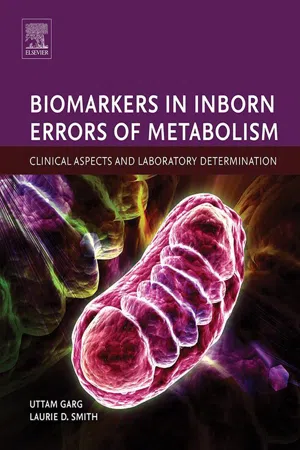
Biomarkers in Inborn Errors of Metabolism
Clinical Aspects and Laboratory Determination
- 476 pages
- English
- ePUB (mobile friendly)
- Available on iOS & Android
Biomarkers in Inborn Errors of Metabolism
Clinical Aspects and Laboratory Determination
About this book
Biomarkers of Inborn Errors in Metabolism: Clinical Aspects and Laboratory Determination is structured around the new reality that laboratory testing and biomarkers are an integral part in the diagnosis and treatment of inherited metabolic diseases. The book covers currently used biomarkers as well as markers that are in development. Because biomarkers used in the initial diagnosis of disease may be different than the follow-up markers, the book also covers biomarkers used in both the prognosis and treatment of inherited metabolic disorders.With the introduction of expanded new-born screening for inborn metabolic diseases, an increasing numbers of laboratories are involved in follow-up confirmatory testing. The book provides guidance on laboratory test selection and interpreting results in patients with suspected inherited metabolic diseases. The book provides comprehensive guidance on patient diagnosis and follow-up through its illustrative material on metabolic pathways, genetics and pathogenesis, treatment and prognosis of inherited metabolic diseases, along with essential information on clinical presentation.Each chapter is organized with a uniform, easy-to-follow format: a brief description of the disorder and pathway; a description of treatment; biomarkers for diagnosis; biomarkers followed for treatment efficacy; biomarkers followed for disease progression; confounding conditions that can either: affect biomarker expression or mimic IEMs; other biomarkers: less established, future.- Provides comprehensive information on the tests/biomarkers selection in newborn screening and follow-up of newborn screens- Categorizes biomarkers into diagnostic markers, disease follow-up markers, and prognostic biomarkers- Covers confounding factors that can alter biomarkers in the absence of inborn errors of metabolism- Offers guidance on how to distinguish acquired causes from inborn errors of metabolism
Frequently asked questions
- Essential is ideal for learners and professionals who enjoy exploring a wide range of subjects. Access the Essential Library with 800,000+ trusted titles and best-sellers across business, personal growth, and the humanities. Includes unlimited reading time and Standard Read Aloud voice.
- Complete: Perfect for advanced learners and researchers needing full, unrestricted access. Unlock 1.4M+ books across hundreds of subjects, including academic and specialized titles. The Complete Plan also includes advanced features like Premium Read Aloud and Research Assistant.
Please note we cannot support devices running on iOS 13 and Android 7 or earlier. Learn more about using the app.
Information
Introduction to laboratory diagnosis and biomarkers in inborn error of metabolism
Abstract
Keywords
1.1 Introduction
Table of contents
- Cover image
- Title page
- Table of Contents
- Copyright
- Dedication
- List of Contributors
- Biographies
- Preface
- Chapter 1. Introduction to laboratory diagnosis and biomarkers in inborn error of metabolism
- Chapter 2. Amino acids disorders
- Chapter 3. Organic acid disorders
- Chapter 4. Disorders of mitochondrial fatty acid β-oxidation
- Chapter 5. Urea cycle and other disorders of hyperammonemia
- Chapter 6. Newborn screening
- Chapter 7. Carbohydrate disorders
- Chapter 8. Mitochondrial disorders
- Chapter 9. Lysosomal storage disorders: Mucopolysaccharidoses
- Chapter 10. Lysosomal storage disorders: Sphingolipidoses
- Chapter 11. Peroxisomal disorders: Clinical and biochemical laboratory aspects
- Chapter 12. Disorders of purine and pyrimidine metabolism
- Chapter 13. Biomarkers for the study of catecholamine and serotonin genetic diseases
- Chapter 14. Cerebral creatine deficiency syndromes
- Chapter 15. Congenital disorders of glycosylation
- Chapter 16. Disorders of vitamins and cofactors
- Chapter 17. Disorders of trace metals
- Index